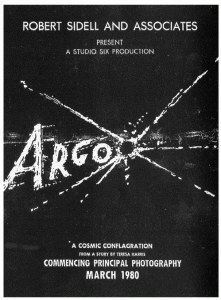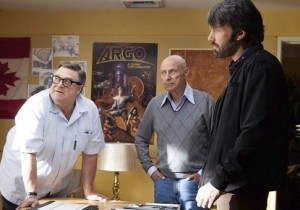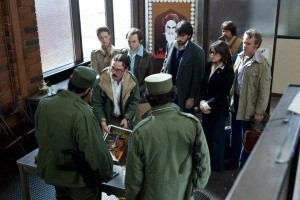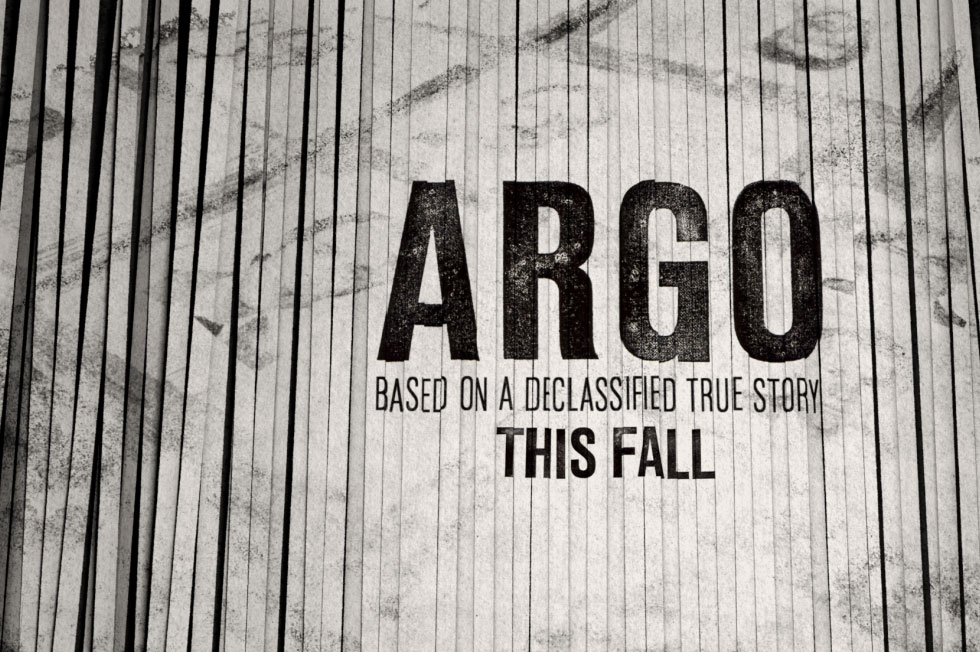 It’s key to the very fundament of filmmaking that we can be excited, thrilled, shocked, horrified, amazed and –most importantly– entertained, even when we know what’s going to happen in a story. That the journey is almost always more important than the destination is sometimes lost in this spoiler-fixated time in which we live and watch, but it’s an important principle when considering a film like Argo. Consider: it’s a matter of now-declassified public records that the whole caper this film revolves around was not only successful, but almost perfectly so. It’s this beautiful characteristic of filmmaking that allows director Ben Affleck to craft such an exhilarating nail-biter of a movie out of a story that audiences will all know as they sit down ends with “them getting away.” It all works anyway, and how.
It’s key to the very fundament of filmmaking that we can be excited, thrilled, shocked, horrified, amazed and –most importantly– entertained, even when we know what’s going to happen in a story. That the journey is almost always more important than the destination is sometimes lost in this spoiler-fixated time in which we live and watch, but it’s an important principle when considering a film like Argo. Consider: it’s a matter of now-declassified public records that the whole caper this film revolves around was not only successful, but almost perfectly so. It’s this beautiful characteristic of filmmaking that allows director Ben Affleck to craft such an exhilarating nail-biter of a movie out of a story that audiences will all know as they sit down ends with “them getting away.” It all works anyway, and how.
Simply put: you’re just not going to spend more time at the edge of your seat in 2012 than you will watching Argo. One of the most carefully crafted films of the year, it’s a triumph of pacing, tone, scope and texture, and it’s unmistakable proof that Affleck has more than earned his place among the most exciting directors still early in their careers behind the camera.
The film gets great early as the day of the Iranian mob takeover of the American embassy plays out with hair-raising precision- we see decisions made, records destroyed, and escapes attempted as the crowd of angry revolutionaries break through gates and storm the facility. It’s a brilliant opening sequence that deftly captures the big of the roaring protests and storming mobs to the small of the hurried conversations and the  shattering of visa printing plates. I don’t know that Spielberg himself could have photographed this event any better. It’s an opening sequences that may very well go down as an all-timer, and it foreshadows just how well Affleck is going to maintain his control over a story that is as much a global event as it is a tiny little operation boiled down to tiny details and momentary judgement calls.
shattering of visa printing plates. I don’t know that Spielberg himself could have photographed this event any better. It’s an opening sequences that may very well go down as an all-timer, and it foreshadows just how well Affleck is going to maintain his control over a story that is as much a global event as it is a tiny little operation boiled down to tiny details and momentary judgement calls.
Once the film flashes forward a few months into the Iranian-American standoff, Affleck enters the film as an actor, and the film finds its confident –if rigid– center. With so many characters, so many locations, and so many disparate tones attempting to live in the same universe in this film, Affleck makes the choice to present CIA tech op Tony Mendez as force of quiet competence. Affleck doesn’t go too deep with Tony- we know he’s a lonely guy, separated from his wife by a job he’s clearly very good at. It’s a sort of ruthless approach to characterization that is consistent throughout the film- you learn what you need to about these characters –be they government officials or the hostages themselves– while archetypes and excellent performances fill in the rest.
Still, even when a character perhaps become more obstinate than really makes sense just to give the film a little extra conflict, the script has been carefully tuned to foreshadow that obstinance earlier in the film- it’s not always perfectly organic, but the clockwork is tight. You can perhaps fault Affleck here for leaving some characters a bit thin, but a wider-lensed look at the film reveals a method that works for this story. None of the chess pieces are that ornately carved, but none are without some kind of texture- and this is a big damn chess board to cover. This isn’t just a standoff between Tony Mendez face-to-face with a revolutionary guard who doesn’t buy his passport, it’s also a race against time for a CIA agent in the US to approve a plane ticket before a child in an Iranian sweatshop finishes reassembling a shredded photo from a five foot pile of paper strips.
 Argo is a tricky proposition of a film on virtually all axes- on one it is balancing worldwide political theater and period context with intimate human details, while on another it is balancing the goofiness of the Hollywood segments with the deathly serious situation in a revolutionary country. On a personal level, Affleck is even balancing his direction of the film with the crafting of his lead performance. This could very much have been a disaster as Affleck tied himself to six horses and galloped them in different directions, but rather than getting torn to pieces in the middle he manages to command them all. And while it’s one thing to spend some time in Hollywood with some cheeky laughs between more grim segments of violence and chaos, it’s quite another to maintain those warmer, funnier characters throughout the film and cut them into the most climactic moments without stripping them of their humor or filling your film with sore thumbs. Credit is also due Alan Arkin, John Goodman, and Bryan Cranston who can all manage humor and seriousness simultaneously, and masterfully.
Argo is a tricky proposition of a film on virtually all axes- on one it is balancing worldwide political theater and period context with intimate human details, while on another it is balancing the goofiness of the Hollywood segments with the deathly serious situation in a revolutionary country. On a personal level, Affleck is even balancing his direction of the film with the crafting of his lead performance. This could very much have been a disaster as Affleck tied himself to six horses and galloped them in different directions, but rather than getting torn to pieces in the middle he manages to command them all. And while it’s one thing to spend some time in Hollywood with some cheeky laughs between more grim segments of violence and chaos, it’s quite another to maintain those warmer, funnier characters throughout the film and cut them into the most climactic moments without stripping them of their humor or filling your film with sore thumbs. Credit is also due Alan Arkin, John Goodman, and Bryan Cranston who can all manage humor and seriousness simultaneously, and masterfully.
Chris Terrio’s screenplay makes some very deft choices in how it handles the period politics, in that it presents things from a righteous American perspective without shame, but delicately presents the Iranians without a heavy hand of judgement. The facts are laid out cleanly and the Iranians in the story are presented as being in the process of a complex, esoteric shift of power that these Americans are simply caught in the middle of. There are no cartoonish villains with turbans, nor does the film bend over backwards to justify some very nasty, extremist events that took place, or the very real violence that threatened these people if caught.
 A constant interweaving of actual news footage and radio reporting helps capture the “moment” of the Iranian Hostage Crisis, and is part of an impressive overall period effect. You really do feel like you’re watching events unfold as they did, and it gives the effect of cultural empathy- I wasn’t even a gleam in my father’s eye when these events took place, and yet I feel like I know what it was like to be in America at the time. For those that might actually remember this unfolding, I imagine the effect will be even greater. The film maintains slavish fidelity to period detail and historical references, so much so that the end credits are actually a slideshow of comparison photos you can almost feel grasping out from the screen for a tech Oscar or two. It borders on tacky, but the contextualization of the story and the heroes involved is ultimately valuable enough to begrudge the showboating.
A constant interweaving of actual news footage and radio reporting helps capture the “moment” of the Iranian Hostage Crisis, and is part of an impressive overall period effect. You really do feel like you’re watching events unfold as they did, and it gives the effect of cultural empathy- I wasn’t even a gleam in my father’s eye when these events took place, and yet I feel like I know what it was like to be in America at the time. For those that might actually remember this unfolding, I imagine the effect will be even greater. The film maintains slavish fidelity to period detail and historical references, so much so that the end credits are actually a slideshow of comparison photos you can almost feel grasping out from the screen for a tech Oscar or two. It borders on tacky, but the contextualization of the story and the heroes involved is ultimately valuable enough to begrudge the showboating.
Argo is about accomplishing something very small –and doing it quietly– on a very big stage. The entire world was watching and the stakes were life and death, and yet it all came down to whether or not this gate agent believed that particular forged document or whether a particular phone call made it through at a particular time. It’s about finding slivers of hope where there is otherwise only grimness. Six people is nothing compared to the dozens of other that remained trapped for over a year, but it was enough to restore the world’s faith that a happy ending was possible. It’s a film that seems timely, without making any easy, belabored parallels that will cheapen it in the future. That’s important, because Argo will be admired for a very long time. One of the best films of the year and supremely entertaining to boot, Argo sets a very high bar for a season sure to be filled with great work.
Rating: 




Out of a Possible 5 Stars
